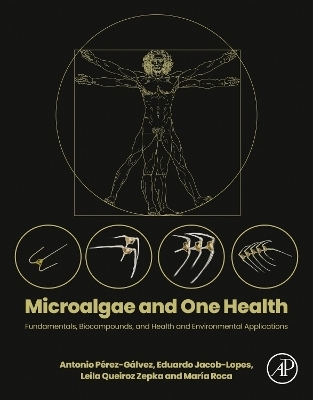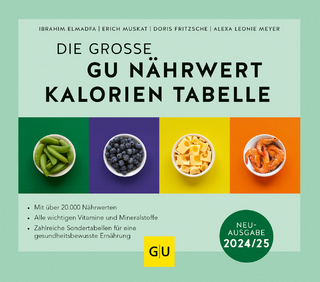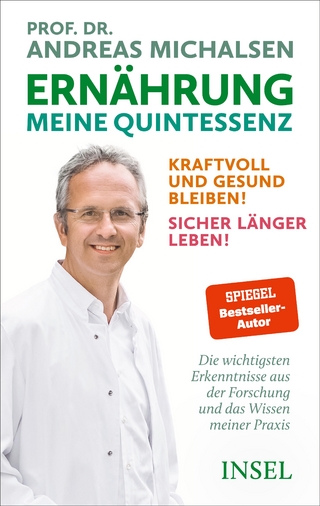
Microalgae and One Health
Academic Press Inc (Verlag)
978-0-443-22080-7 (ISBN)
- Noch nicht erschienen (ca. Juni 2025)
- Versandkostenfrei innerhalb Deutschlands
- Auch auf Rechnung
- Verfügbarkeit in der Filiale vor Ort prüfen
- Artikel merken
Dr. Antonio Pérez-Gálvez is a researcher and head of the Department of Food Phytochemistry Department, Instituto de la Grasa, Spain. He specializes in pigment chemistry and biochemistry. His research is focused on food, functional ingredients, and health with special emphasis on carotenoids. Prof. Eduardo Jacob-Lopes is an Associate Professor at the Department of Food Technology and Science, Federal University of Santa Maria (UFSM), Brazil. He has more than 15 years of teaching and research experience and has coordinated more than 50 research projects and/or technological development financed by public funding agencies and private initiatives. He is a member of the editorial board of 10 journals and acts as a reviewer for several national and international journals. Dr. Jacob-Lopes’ research focuses on bioprocess engineering with an emphasis on microalgal biotechnology. His current research takes a multidisciplinary view of applied phycology and its intersection with bioprocess engineering and sustainable engineering. Dr. Leila Queiroz Zepka is currently an Associate professor at the Department of Food Technology and Science, Federal University of Santa Maria (UFSM). She has more than 15 years of teaching and research experience. She has published more than 500 scientific publications/communications, which include 10 books, 50 book chapters, 100 original research papers, 350 research communications in national and international conferences, and 12 patents. She is a member of the editorial board of 5 journals and acts as a reviewer for several national and international journals. Her research interest includes microalgal biotechnology with an emphasis on microalgae-based products. Dr. María Roca is a researcher at the Food Phytochemistry Department, Instituto de la Grasa, Spain. She specializes in bioactive compounds in foods and biobased products, with special emphasis on chlorophylls and their derivatives. Her research topics include carotenoids, chlorophyll breakdown, in vitro digestion, and bioavailability.
Part I: Fundamentals
1. Microalgae in the context of One Health
2. Microalgae in food design and health nutrition
3. Microalgae in animal wellness
4. Microalgae-based technologies applied to environmental sustainability
5. Chemical composition of microalgae with potential for bioactive compounds
6. Metabolic plasticity of microalgae and its interfaces with environmental processes
7. Technologies for microalgae production
8. Algae industry and the farm-to-fork strategy
Part II: Biocompounds from Microalgae
9. Proteins and peptides
10. Carbohydrates and exopolysaccharides
11. Lipids and fatty acids
12. Minerals, vitamins, and trace elements
13. Chlorophylls and their derivatives
14. Carotenes and xanthophylls
15. Phycobiliproteins: phycocyanin, allophycocyanin, and phycoerythrin
16. Sterols
17. Phenolic compounds
18. Toxins
19. Recent advances in the discovery of novel microalgae-based molecules
Part III: Therapeutic Potential and Applications in Humans
20. Microalgae as an agent to improve blood quality and prevention of anemia
21. Evidence of use of microalgae on glycemic control and glucose metabolism
22. Anti-inflammatory molecules in microalgae
23. Antioxidant potential of microalgae
24. Microalgae with immunomodulatory activities
25. Microalgae for the prevention of cardiovascular diseases
26. Microalgae as a neuroprotective agent
27. Evidence of use of microalgae in cancer therapy
28. Microalgae on cataract and macular degeneration protection
29. Evidence of use of microalgae as antimicrobial agent
30. Microalgae potential on the treatment of allergic rhinitis
31. Microalgae as vaccine transporters
32. Microalgae in the production of monoclonal antibodies
33. Microalgal-based micro/nanocarriers in drug delivery
Part IV: Microalgae and Their Animal Health-Promoting Benefits
34. Applications of microalgae for disease control in aquaculture
35. Evidence of poultry health and microalgae
36. Microalgae and its impact on ruminant nutrition and health
37. Benefits of the use of microalgae on nutrition and health of monogastrics
38. Performance of microalgae-based feed on pet health
Part V: Environmental Sustainability and Applications
39. Microalgae in wastewater treatment
40. Microalgae in the removal of emerging pollutants
41. Microalgae in greenhouse gas control
42. Microalgae applications in soil improvement
43. Sustainability metrics and indicators in microalgae-based processes and products
Part VI: Market Analysis, Safety, and Regulatory Aspects
44. The bioeconomy of microalgae-based products
45. Market analysis of microalgae-based products
46. Safety issues on microalgae-based products
47. Regulatory key points on microalgae-based products
| Erscheint lt. Verlag | 1.6.2025 |
|---|---|
| Verlagsort | San Diego |
| Sprache | englisch |
| Maße | 216 x 276 mm |
| Themenwelt | Sachbuch/Ratgeber ► Gesundheit / Leben / Psychologie ► Ernährung / Diät / Fasten |
| Naturwissenschaften ► Biologie ► Limnologie / Meeresbiologie | |
| Technik ► Lebensmitteltechnologie | |
| ISBN-10 | 0-443-22080-8 / 0443220808 |
| ISBN-13 | 978-0-443-22080-7 / 9780443220807 |
| Zustand | Neuware |
| Informationen gemäß Produktsicherheitsverordnung (GPSR) | |
| Haben Sie eine Frage zum Produkt? |
aus dem Bereich


